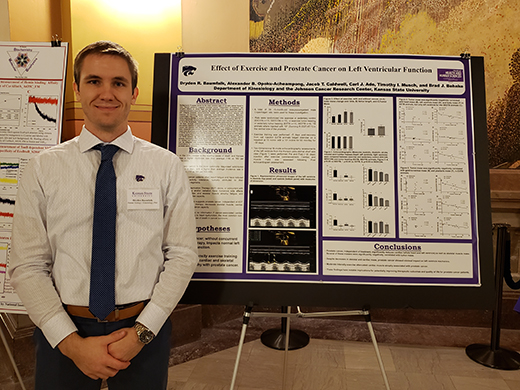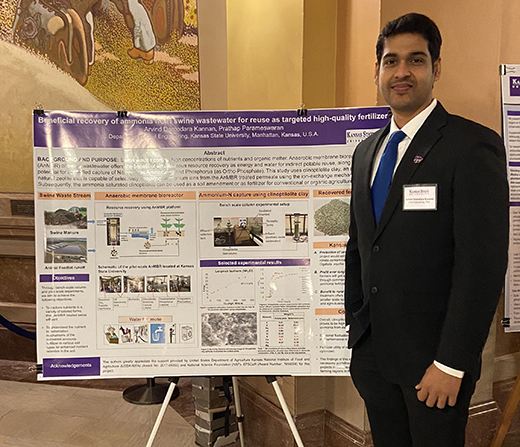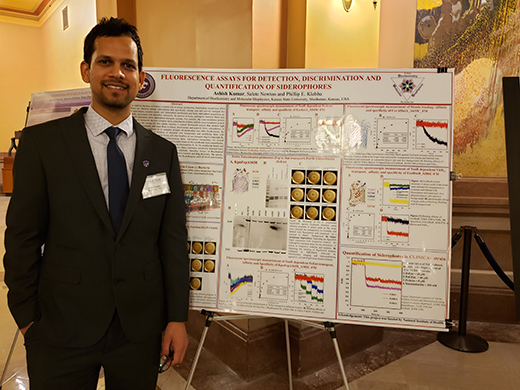Three graduate students receive awards for their State Capitol poster presentations
Tuesday, March 17, 2020

Dryden Baumfalk doctoral student in kinesiology, was Kansas State University's winner of the BioKansas Scholarship at the 17th Capitol Graduate Research Summit. Baumfalk studies the effect of moderate-intensity exercise on skeletal and cardiac muscle mass in prostate cancer patients. | Download this photo.
MANHATTAN — Three Kansas State University graduate students received statewide recognition for their Kansas-related research at the 17th Capitol Graduate Research Summit, Feb. 26, at the State Capitol in Topeka.
Dryden Baumfalk, Colby, doctoral student in human ecology specializing in kinesiology; Arvind Damodara Kannan, doctoral student in civil engineering, India; and Ashish Kumar, doctoral student in biochemistry, India, were the three Kansas State University winners at the Capitol Graduate Research Summit. Kannan was the Kansas State University winner and recipient of a $500 scholarship. Kumar and Baumfalk were selected as award recipients by BioKansas. Kumar received a $500 award sponsored by MO Valley PDA, and Baumfalk received a $100 award sponsored by Labcono. Both Kumar and Baumfalk received a $250 certificate for enrollment in a professional development workshop sponsored by BioKansas.
The Capitol Graduate Research Summit is a statewide event that features current research of graduate students at Kansas State University, the University of Kansas, the University of Kansas Medical Center, Wichita State University, Fort Hays State University, Emporia State University and Pittsburgh State University. Each university invited a university professor and an industry representative to judge the student poster presentations. The top presenters from each university received awards. Additionally, BioKansas judges selected one winner from each school whose research best aligns with the mission of BioKansas. BioKansas judges also selected four award recipients for research related to drug development.
Baumfalk's poster was "Effects of prostate cancer and exercise training on left ventricular function and cardiac and skeletal muscle mass." His adviser is Bradley Behnke, professor of kinesiology.
Baumfalk's research deals with prostate cancer and exercise. Prostate cancer is the most common solid tumor diagnosis among men, and the incidence rate of prostate cancer in Kansas is higher than the national average. Baumfalk's research demonstrates the atrophic effects of prostate cancer on cardiac and skeletal muscle mass independent of anti-cancer treatments that can be mitigated with moderate-intensity exercise. These findings have notable implications for potentially improving therapeutic outcomes and quality of life for prostate cancer patients.
"The Capitol Graduate Research Summit was a unique experience to share my research among a diverse group of graduate students and attendees," Baumfalk said. "At times I was presenting to peers who had constructive questions and criticism, while at other times I was conversing with an audience seeing this type of scientific information for the first time. The differing styles required for properly disseminating my research to both audiences will be very valuable to my future presentations and personal growth as a graduate student."
Kannan's poster was "Beneficial recovery of ammonia from swine wastewater for reuse as a targeted slow-release fertilizer." His adviser is Prathap Parameswaran, assistant professor of civil engineering.
Kannan's research examines anaerobic membrane bioreactor treatment of swine wastewater from animal feeding operations to extract valuable fertilizer macronutrients, such as nitrogen and phosphorus. The major goal of this work is to produce an ammonia-based soil fertilizer to enhance soil quality, prevent nitrate and phosphorus contamination in surface water and groundwater aquifers, and eliminate greenhouse gas emissions due to land application of agriculture waste biosolids. This could create a greener workforce in rural Kansas communities pivoted around nutrient product marketing, water and renewable energy — biogas — management, as well as reused water reallocation budgeting, without compromising cropland and food safety.
"I had the opportunity of interacting with people from a variety of backgrounds and learned a lot from them," Kannan said. "This includes legislators, industry representatives, the scientific community and anyone who was interested in learning more about the research we do at K-State. This was a two-way learning experience where I learned from legislators about their policy vision and provided them with insight on how they could incorporate my research findings to frame policies addressing environmental issues in Kansas."
Kumar's poster was "Fluorescence assays for detection, discrimination, and quantification of siderophores." His adviser is Phillip Klebba, university distinguished professor in the department of biochemistry and molecular biophysics.
Kumar's research focuses on creating fluorescent sensors that detect, discriminate and quantify small molecules in the environment. His research demonstrated this technology by studying microbial iron chelators, called siderophores, that are secreted by bacterial pathogens to obtain iron in human and animal hosts. The sensors are useful for many purposes, including rapid identification of siderophores in clinical and food samples, and detection of specific infectious bacteria in blood, serum, tissues or foods.
"The Capitol Graduate Research Summit was a first of kind opportunity for me to present my research in front of a diverse group of students, professors and industry representatives from all over the state of Kansas, and especially state legislators who seemed so kind and interested to know about our research," Kumar said. "I would also thank K-State for giving me this wonderful opportunity."
To learn more about the Capitol Graduate Research Summit and who participated in the event visit the Capitol Graduate Research Summit website.


